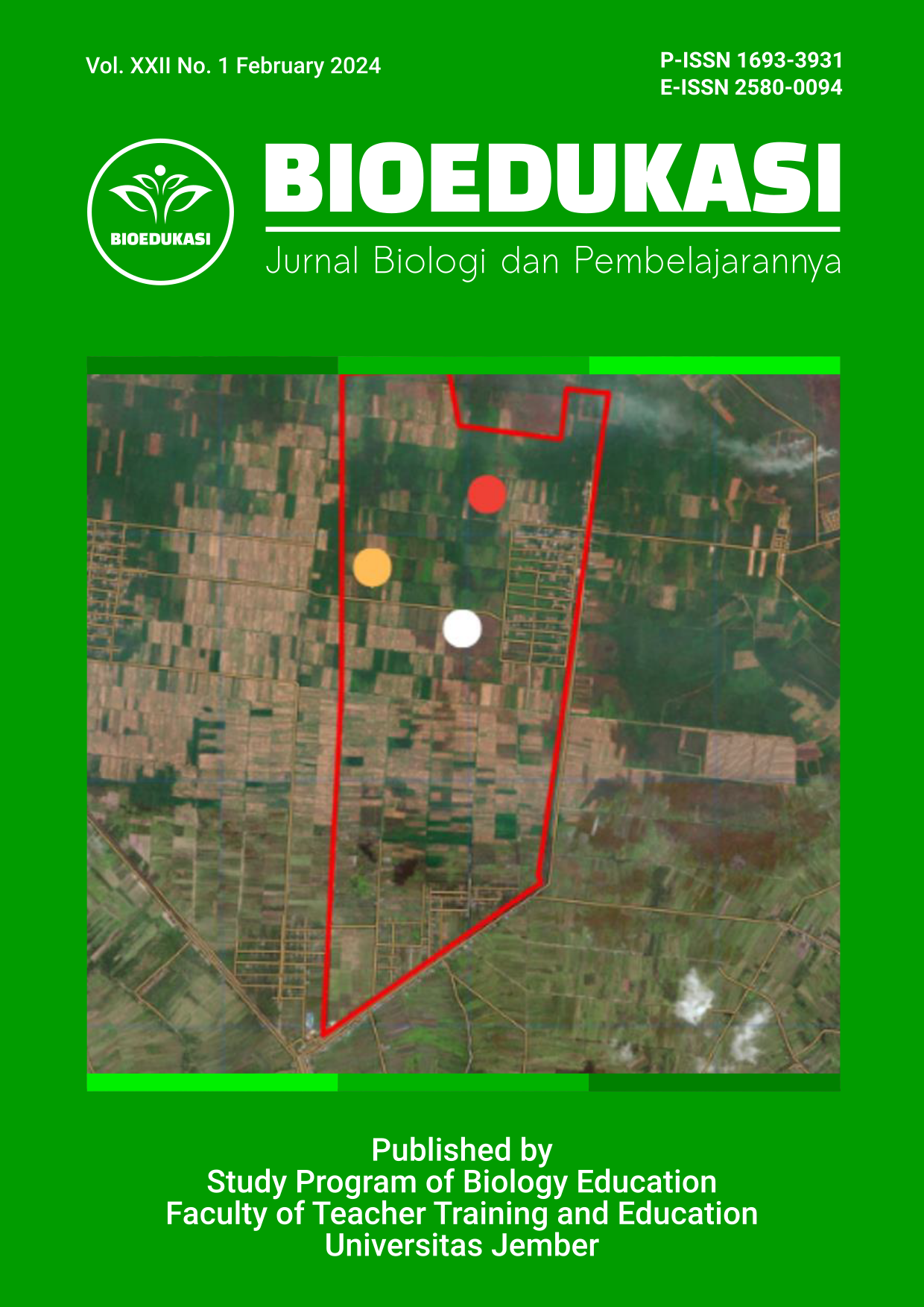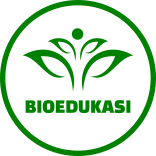The Influence of Problem-Oriented Project-Based Learning (POPBL) on Students' Creative Thinking Skills
DOI:
https://doi.org/10.19184/bioedu.v22i1.44648Keywords:
Creative Thinking Skills, POPBLAbstract
Problem and project-based learning can develop students' creative thinking skills because students will learn better if they engage in meaningful learning activities. The implementation of this study uses the Problem-Oriented Project-Based Learning (POPBL) model to direct students to create creative products. This study aims to measure the effect of problem-based learning and projects on the creative thinking skills of grade X students of SMA Negeri 10 Malang. The method used in this study is quasi-experimental research using Pretest Post-test Nonequivalent Control Group Design. The results of the essay test were analyzed using the analysis of covariance (ANCOVA) test. The results showed that the application of Problem-Oriented Project-Based Learning (POPBL) had a significant effect on students' creative thinking skills. These findings suggest that problem- and project-based learning models can develop students' capacity for creative thinking skills.
Downloads
References
Alfi. (2016). Pengaruh Pembelajaran Geografi Berbasis Masalah Dengan Blended Learning Terhadap Kemampuan Berpikir Kritis Siswa SMA. Jurnal Pendidikan, 1(4): 67-68.
Antika, R. N., & Nawawi, S. (2017). Pengaruh model project based learning pada mata kuliah seminar terhadap keterampilan berpikir kreatif mahasiswa. Jurnal Pendidikan Biologi Indonesia, 3(1), 72-79.
Arini, W. (2017). Analisis kemampuan berpikir kreatif pada materi cahaya siswa kelas Delapan
SMP Xaverius Kota Lubuklinggau. Science and Physics Education Journal (SPEJ), 1(1),
23–38. https://doi.org/10.31539/spej.v1i1.41
Arifin, Z. (2017). Mengembangkan Instrumen Pengukur Critical Thinking Skills Siswa pada Pembelajaran Matematika Abad 21. Journal THEOREMS (The Original Research of Mathematics), 1(2), 92-100. https://jurnal.unma.ac.id/index.php/th/article/view/383
Baihaqi, A. (2022). Peningkatan hasil belajar siswa dengan PBL pada siswa kelas IX MTs Miftahul Aula. Global Journal Science IPA, 1(1), 1-13.
Barge, S. (2010). Prinsiple Of Problem and Project Based Learning: The Aalborg PBL Models. Aalborg University
Chung, Y., Yoo, J., Kim, S.-W., Lee, H., & Zeidler, D. L. (2014). Enhancing students’ communication skills in the science classroom through socioscientific issues. International Journal of Science and Mathematics Education, 1–27.
Darmawan, E., Yusnaeni, Ismirawati, N., & Ristanto, R. H. (2021). Strategi Belajar Mengajar Biologi. Magelang: Putaka Rumah Cinta.
Eragamreddy, N. (2013). Teaching Creative Thingking Skills. Tesis. IJ-ELTS: International Journal of English Language & Translation Studies Libya: The University of Sebha.
Göksoy, S. (2014). Teacher candidates (Pedagogical formation students) communication skills. Creative Education, 5, 1334–1340
Greenstein, L. (2012). Assessing 21st Century Skills: A Guide to Evaluating Mastery and Authentic Learning. Corwin A Sage Company.
Hutasoit, S. A. (2021). Pembelajaran Teacher Centered Learning (TCL) dan Project Based Learning (PBL) dalam Pengembangan Kinerja Ilmiah dan Peninjauan Karakter Siswa. Jurnal Pendidikan Indonesia, 2(10), 1775-1799.
Ibrohim, I., Purwaningsih, E., Munzil, M., Hidayanto, E., Sudrajat, A. K., Saefi, M., & bin Hassan, Z. (2022). Possible links between Indonesian science teacher’s TPACK perception and demographic factors: Self-reported survey. EURASIA Journal of Mathematics, Science and Technology Education, 18(9), em2146.
Latada, F., & Kassim, H. (2017). Project-oriented problem-based learning (Popbl): an initiative to enrich soft skills among students at a public university. Journal of Global Business and Social Entrepreneurship (GBSE), 1(3), 75-83.
Mahanal, S., Zubaidah, S., Sumiati, I. D., Sari, T. M., & Ismirawati, N. (2019). RICOSRE: A Learning Model to Develop Critical Thinking Skills for Students with Different Academic Abilities. International Journal of Instruction, 12(2), 417-434.
Mas’ud, A. (2018). Peningkatan Hasil Belajar Biologi Siswa Melalui Penerapan Model Pembelajaran Kooperatif Tipe Group Investigation. Jurnal BIOEDUIN: Biology Education of Indonesia, 8(1), 43-47.
Nichols, J. 2013. 4 Essential Rules of 21st Century Learning. http://www.teachthought.com/learning/4-essential-rules-of-21stcentury-learning/.
Putri, Y S., & Alberida, H. (2022). Keterampilan Berpikir Kreatif Peserta Didik Kelas X Tahun Ajaran 2021/2022 di SMAN 1 Pariman. BIODIK: Jurnal Ilmian Pendidikan Biologi, 8(2), 112-117. https://doi.org/10.22437/bio.v812.17356.
Rongbutsri, N. (2017). Aalborg Universitet Students Using Online Collaborative Tools in Problem Oriented Project Based Learning Rongbutsri, Nikorn Publication date: 2017.
Sari, Y. (2023). Problem Oriented Project Based Learning Meningkatkan Hasil Belajar dan Kemampuan Berpikir Kritis Siswa. Bioma: Jurnal Biologi dan Pembelajaran Biologi, 8(1).
Sari, I. P., Nofrianto, A., & Amri, M. A. (2017). Creative Problem Solving: bagaimana pengaruhnya terhadap kreativitas siswa?. Jurnal Elemen, 3(1), 87-96. https://doi.org/10.29408/jel.v3i1.340.
Setiawati, P. N. (2018). Pengembangan LKPD IPA Berbasis Service Learning Untuk Meningkatkan Kemampuan Reflective Thinking Siswa. Jurnal Diklabio 2 (1): 76-85.
Susilo, H., Kristiani, N., & Sudrajat, A. K. (2020). Development of 21st century skills at the senior high school: Teachers’ perspective. In AIP Conference Proceedings (Vol. 2215, No. 1). AIP Publishing.
Suwono, H., Rizkita, L., & Susilo, H. (2017). Peningkatan literasi saintifik siswa SMA melalui pembelajaran biologi berbasis masalah sosiosains. Jurnal Ilmu Pendidikan, 21(2).
Trilling, B., Fadel, C. (2009). 21st century skills: learning for life in our times. USA: Jossey-Bass
Utami, W. S., Ramli, M., Ariyanto, J., & Riyanto, B. (2018). Memperbaiki Kemampuan Berpikir Kreatif Siswa melalui Problem Based Learning dan Creative Problem-Solving Processdi Pelajaran Biologi. In Proceeding Biology Education Conference: Biology, Science, Enviromental, and Learning (Vol. 15, No. 1, pp. 082-089).
Woods, D. (2014). Problem-Based Learning (PBL). McMaster University. http://chemeng.mcmaster.ca/problembased-learning.
Zubaidah, S. (2016). Keterampilan Abad Ke-21: Keterampilan yang Diajarkan melalui Pembelajaran. Seminar Nasional Pendidikan, 2(2), 1-17. https://doi.org/10.1021/acs.langmuir.6b02842






